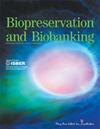L-Proline as a Cryoprotective Agent for the Preservation of Galea Spixii Skin Fibroblasts.
IF 1.4
4区 生物学
Biopreservation and Biobanking
Pub Date : 2025-04-01
Epub Date: 2024-07-10
DOI:10.1089/bio.2024.0006
引用次数: 0
L-脯氨酸作为一种低温保护剂用于保存 Galea Spixii 皮肤成纤维细胞
体细胞生物库是开发生殖技术的一项前景广阔的战略。虽然冷冻保存是一种用于建立生物库的技术,但对其细胞造成的结构和生理损伤凸显了优化所使用的冷冻保护溶液的必要性。因此,我们对 5 mM L-脯氨酸的渗透保护活性进行了评估,将其作为保护刺五加成纤维细胞的另一种低温保护剂。该浓度是根据以前对哺乳动物细胞进行的研究确定的。从六个人的皮肤中提取的细胞经培养至第五周期后,在以下处理下进行冷冻保存:(i) 对照组(非冷冻保存);(ii) 含 10%二甲基亚砜(Me2SO)、10%胎牛血清(FBS)和 0.2 M 蔗糖的溶液;(iii) 含 10%二甲基亚砜(Me2SO)、10%胎牛血清(FBS)和 5 mM L-脯氨酸的溶液;以及 (iv) 含 10%二甲基亚砜(Me2SO)、10%胎牛血清(FBS)、0.2 M 蔗糖和 5 mM L-脯氨酸的溶液。试验分析了细胞形态、活力、新陈代谢、增殖和凋亡;活性氧(ROS)水平;线粒体膜活性(ΔΨm)。与对照组(86.7% ± 2.0%)和 L-脯氨酸组(88.4% ± 1.8% 和 87.8% ± 2.1%)相比,含蔗糖组的存活细胞数减少了(72.3% ± 1.2%)。经过凋亡分析,观察到仅含蔗糖组(74.6% ± 4.1%)的存活细胞数量比对照组(88.2% ± 1.1%)有所减少。在添加 L-脯氨酸的组别中观察到的 ROS 水平(分别为 1.03 ± 0.5 和 1.07 ± 0.5)和 ΔΨm 值(分别为 0.99 ± 0.42 和 1.22 ± 0.73)与对照组(分别为 1.00 ± 0.5 和 1.00 ± 0.4)相似。此外,各组在细胞形态、新陈代谢或增殖方面均未发现差异。因此,L-脯氨酸是一种低温保护剂,可单独或与蔗糖一起用于 G. spixii 成纤维细胞的低温保存。此外,我们还为 G. spixii 建立了一个适当的生物库,储存的细胞可用于繁殖技术。
本文章由计算机程序翻译,如有差异,请以英文原文为准。
求助全文
约1分钟内获得全文
求助全文
来源期刊

Biopreservation and Biobanking
Biochemistry, Genetics and Molecular Biology-General Biochemistry,Genetics and Molecular Biology
自引率
12.50%
发文量
114
期刊介绍:
Biopreservation and Biobanking is the first journal to provide a unifying forum for the peer-reviewed communication of recent advances in the emerging and evolving field of biospecimen procurement, processing, preservation and banking, distribution, and use. The Journal publishes a range of original articles focusing on current challenges and problems in biopreservation, and advances in methods to address these issues related to the processing of macromolecules, cells, and tissues for research.
In a new section dedicated to Emerging Markets and Technologies, the Journal highlights the emergence of new markets and technologies that are either adopting or disrupting the biobank framework as they imprint on society. The solutions presented here are anticipated to help drive innovation within the biobank community.
Biopreservation and Biobanking also explores the ethical, legal, and societal considerations surrounding biobanking and biorepository operation. Ideas and practical solutions relevant to improved quality, efficiency, and sustainability of repositories, and relating to their management, operation and oversight are discussed as well.
 求助内容:
求助内容: 应助结果提醒方式:
应助结果提醒方式:


